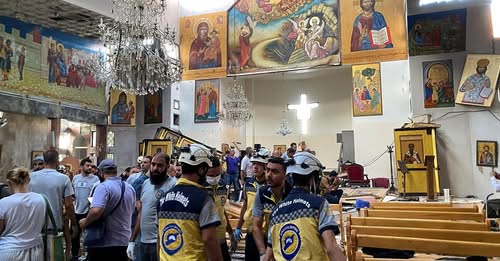At least 15 people were killed and more than a dozen injured on Sunday when a suicide bomber detonated himself inside the Mar Elias Church in Damascus’s Dweila neighborhood, according to Syrian security officials. The brutal attack, which occurred during the Divine Liturgy, marks the first suicide bombing in the Syrian capital since an Islamist-led insurgency ousted President Bashar al-Assad in December.
Syria’s Interior Ministry identified the attacker as a member of the Islamic State (ISIS). In an official statement, the ministry said the assailant entered the Greek Orthodox church during worship, opened fire on congregants, and then detonated an explosive vest.
A security source, speaking under condition of anonymity, reported that two men were believed to be involved in the operation, though only one carried out the detonation.
The Syrian Health Ministry, as quoted by the state-run news agency SANA, placed the preliminary death toll at nine, with 13 others wounded. However, later reports from civil defense teams confirmed at least 15 fatalities.
Dramatic footage livestreamed by the White Helmets, Syria’s volunteer civil defense group, showed the harrowing aftermath. Inside the church, blood stained the floor, pews were torn apart, and pieces of shattered masonry lay scattered among the wreckage. Screams and cries for help echoed as emergency workers navigated the ruins.
President Ahmed al-Sharaa, who assumed leadership in January as head of Syria’s transitional government, condemned the attack and vowed continued protection of religious minorities. “This heinous act targets not just our Christian brothers and sisters, but the unity and resilience of the Syrian people,” al-Sharaa said in a statement. “We will not let terrorism dictate our future.”
The Mar Elias Church is one of the oldest in the area and has remained open throughout much of Syria’s civil unrest, often viewed as a symbol of interfaith endurance. Sunday’s attack has now shattered that fragile calm.
There has been no official claim of responsibility beyond the ministry’s attribution to ISIS, but the attack reflects growing concerns over the reemergence of jihadist violence amid Syria’s political transition.
International condemnation poured in from regional leaders and global religious institutions. Pope Francis, in a brief Sunday address, called the bombing “an atrocity against God and humanity.”
As investigators continue to piece together the details, grief-stricken families gathered outside the church, some holding pictures of loved ones. Funerals are expected to begin Monday under heightened security.
The bombing has reignited fears that the collapse of the Assad regime may have created a vacuum now being exploited by extremist factions.




